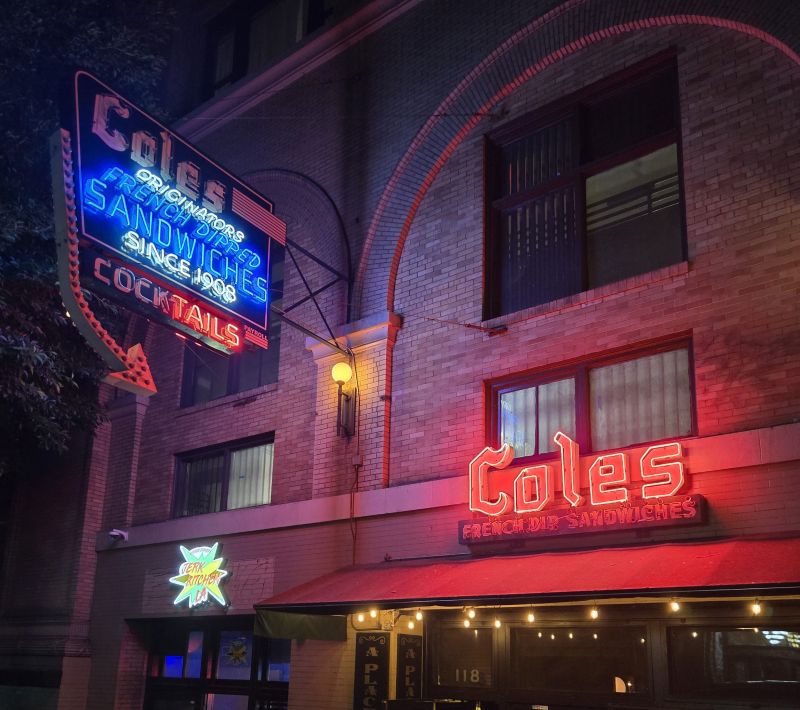End of an Era as Cole’s Prepares to Close After 117 Years Serving Los Angeles
After more than a century of serving Angelenos, Cole’s French Dip, the city’s oldest continuously operating restaurant, will shut its doors on August 3, marking the end of an institution that survived world wars, Prohibition, and the rise of Hollywood. The closure comes as yet another blow to the city’s vanishing historic dining culture.
The downtown landmark, established in 1908, has been a fixture in the Pacific Electric Building, once the bustling terminus for Los Angeles’ iconic Red Car trolley line. Generations of diners — from attorneys and politicians to journalists and celebrities — have passed through its swinging doors. Now, after 117 years of operation, Cole’s becomes the latest casualty in a wave of closures impacting independent restaurants across the city.
Economic Pressures Seal the Fate of a Legend
Owner Cedd Moses attributed the decision to economic strain, citing the lingering effects of the COVID-19 pandemic, the 2023 Hollywood strikes, and rising rent and labor costs. In a public statement, Moses said, “The litany of reasons for closing are not unique to Cole’s alone; they are affecting most independent restaurants in Los Angeles.”
The closure of Cole’s follows other high-profile losses, including The Original Pantry, which closed in March after 101 years, and the demolition of Pacific Dining Car, a beloved institution for over a century.
"By the time the Olympics get here, all these mom-and-pop establishments will be gone," Moses warned. "Hopefully it’s a wake-up call for the right people to step up and figure out a plan."
Steeped in History and Grit
Harry Cole opened the restaurant in 1908, and over the decades, Cole’s became a favorite gathering place for the city’s financial elite, newspaper writers, and even the occasional mobster. A 2009 reflection on its early days noted that it was a place for “bankers, attorneys, newspaper types and politicians — as well as more respectable folks.”
After briefly closing in 2007, the restaurant was purchased and restored by Moses’s 213 Nightlife group, later rebranded as Pouring With Heart. A $1.6 million restoration effort preserved the historic ambiance, including the vintage booths, original tile floors, and dark wood bar that became synonymous with Cole’s atmosphere.
In 2009, the restaurant introduced a new twist on its legacy by opening The Varnish, a speakeasy-style cocktail bar tucked inside a former storage room. The bar would become a staple of Los Angeles nightlife, even attracting renowned food critic Jonathan Gold, before it, too, shut down in 2024.
The French Dip Debate
One of Cole’s lasting legacies is its role in the creation of the French dip sandwich, though the claim remains hotly contested. According to Cole’s, the sandwich originated in 1908 when a chef dipped a sandwich in au jus to accommodate a customer with dental issues.
Just under two miles away, Philippe the Original lays competing claim to the invention. Their story traces the sandwich to 1918, when Philippe Mathieu supposedly dropped a French roll into meat juices while preparing a sandwich for a police officer, who enjoyed it so much he returned the next day with friends. However, variations of Philippe’s origin story exist — including one in which the sandwich was first made for a firefighter in 1917.
In a 1951 interview, Mathieu recalled, “One day a customer saw some gravy in the bottom of a large pan of roast meat. He asked me if I would mind dipping one side of the French roll in that gravy. I did, and right away five or six others wanted the same.” Regardless of the true origin, the sandwich became a local legend, forever linking both establishments in culinary history.
A Closing That Marks More Than a Restaurant
The loss of Cole’s signals more than the end of a dining spot — it represents the slow erasure of Los Angeles’ cultural and architectural heritage. As rising costs and urban development pressures mount, legacy businesses that shaped the character of neighborhoods are increasingly at risk.
For many longtime residents, Cole’s was not just a place to eat, but a link to the city’s storied past. Its closure is a poignant reminder of how fragile that history can be.

COMMENTS (0)
Sign in to join the conversation
LOGIN TO COMMENT